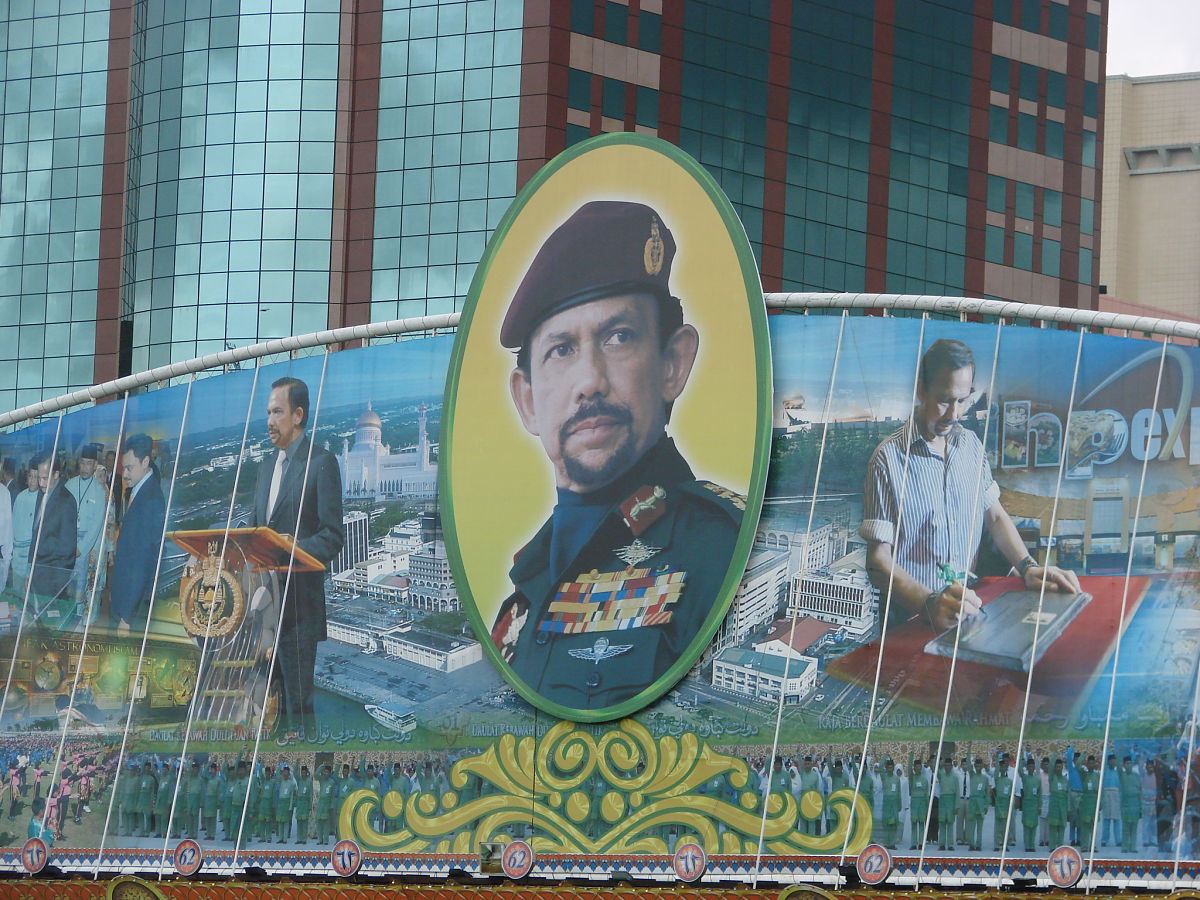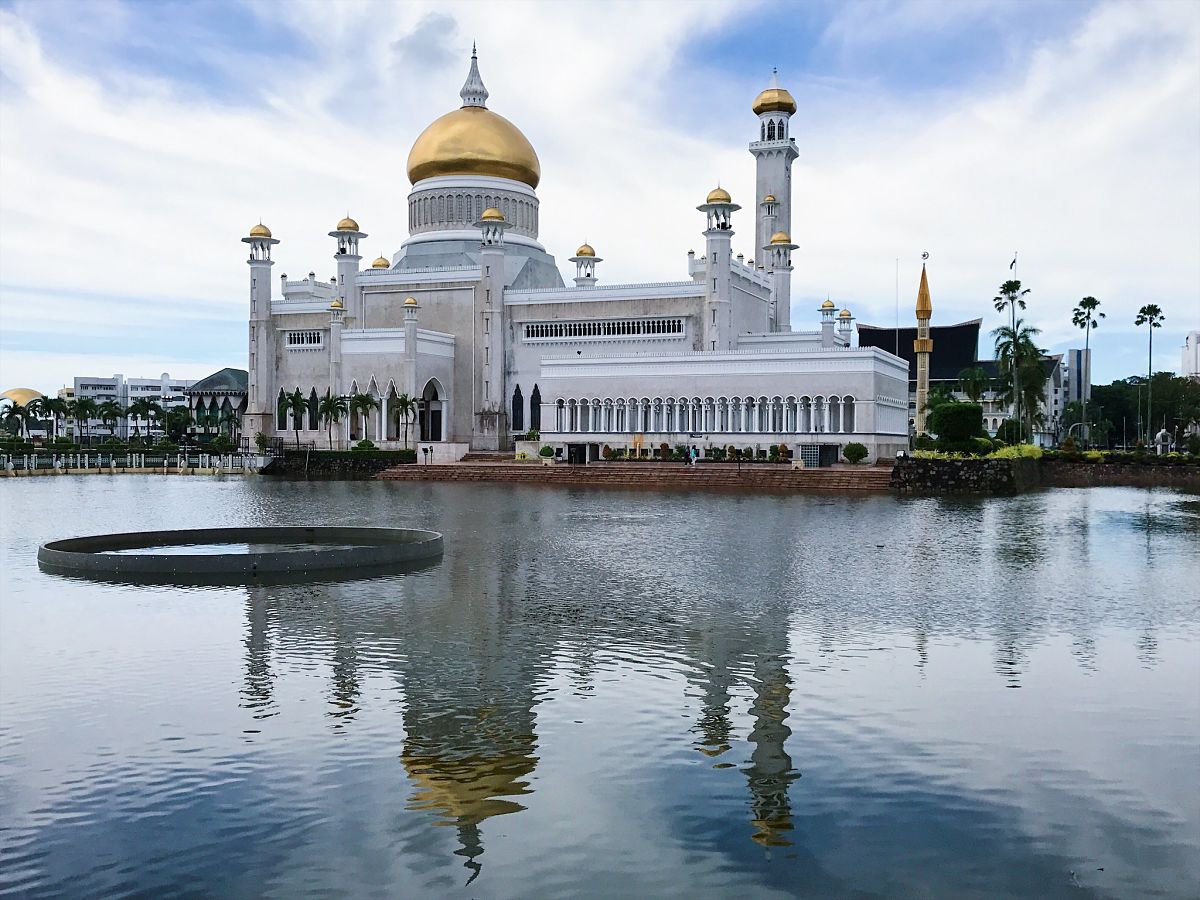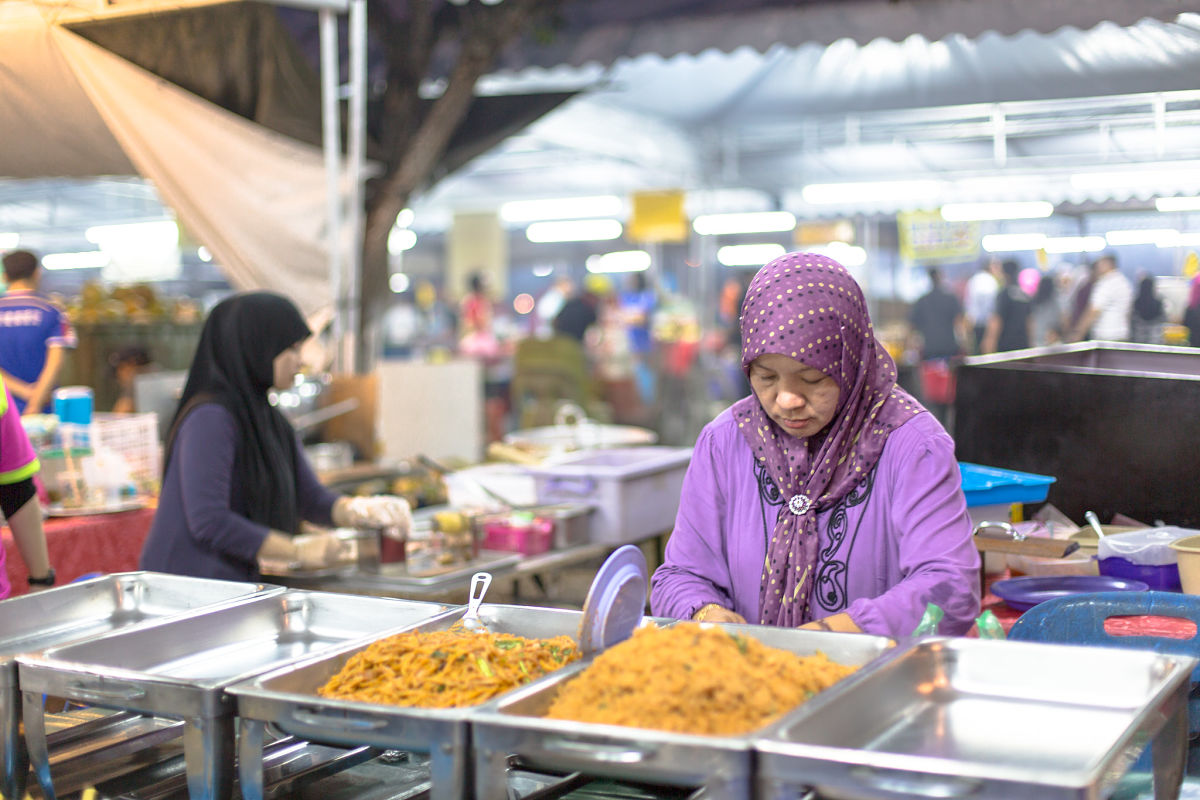Brunei - Culture, Etiquette and Business Practices
What will you Learn?
You will gain an understanding of a number of key areas including:
- Language
- Religion and beliefs
- Culture and society
- Social etiquette and customs
- Business culture and etiquette

The Father of the Nation, portrayed in many positive ways. Photo by watchsmart (CC BY 2.0)
Stereotyping
Remember this is only a very basic level introduction to Brunei culture and the people; it cannot account for the diversity within Bruneian society and is not meant in any way to stereotype all Bruneian people you may meet!
Facts and Statistics
- Location: Southeastern Asia, bordering the South China Sea and Malaysia
- Capital: Bandar Seri Begawan
- Climate: tropical; hot, humid, rainy
- Population: 437,479 (2020)
- Ethnic Make-up: Malay 66.3%, Chinese 11.2%, indigenous 3.4%, other 19.1% (2018 est.)
- Religions: Muslim (official) 67%, Buddhist 13%, Christian 10%, other (includes indigenous beliefs) 10%
- Government: constitutional sultanate
Language in Brunei
- Due to Brunei's rich history, which has seen the country become the seat of the Malay empire and the subject of European invasion, Brunei is a melting pot for international languages.
- The official language of the state of Brunei is Standard Malay. This came into force on 29th September 1959, with the signing of Brunei 1959 Constitution.
- English is also widely used as a business and working language. It is also the language of instruction in secondary and tertiary education.
- Other languages spoken in Brunei include the Chinese, Indian and Native languages spoken by the minority ethnic groups.
Bruneian Society and Culture
The Family
The family is the focal point of the social structure. The Bruneian family is the extended family and includes aunts, uncles, and cousins as well as close friends.
- Members of the extended family are expected to remain loyal to each other and the family.
- As a result of this Brunei is a hierarchical culture. Age and position are revered.
- From a young age, children are taught to subjugate their own desires for the good of the entire family and to respect elders without question. I
- n addition they also learn that it is through family support that they accomplish goals.
The Concept of Face
The role of face, shame and honour is crucial to Bruneians. Consequently they are very polite and well-mannered.
- Maintaining face is of upmost importance and they do their best not to cause issues or problems which could jeopardize this.
- In order to maintain face their communication style is very indirect and can come across as somewhat ambiguous to those from a culture where direct communication is the norm.
- By being indirect Bruneians avoid embarrassing another person, which would cause that person to lose face.
- As a consequence, this approach is an important way of protecting relationships
- Most Bruneians find emotions such as impatience, anger, or irritation embarrassing and try to avoid them since expressing them could result in a loss of face and disharmony.
Religion
Most Bruneians are Muslims and as such their lives revolve around the duties afforded to them by Islam.
- Alcohol is banned from the country however pork is allowed for non-Muslims.
- Gender relations are also governed by Islamic principles and etiquette.
- Shaking hands across genders is rare.
- As such, if you are visiting Brueni, then consider placing your right hand over your heart and giving a small bow if meeting someone of the opposite sex.
- Bruneians practice a devout but tolerant brand of Islam, which includes devotion, yet allows other faiths and beliefs.
- Muslims must pray five times a day – at dawn, noon, afternoon, sunset, and evening.
- Friday is the Muslim holy day. Everything is closed. Many companies as well as government offices also close on Sunday and Saturday afternoon.
- During the fasting month of Ramadan, government staff works a six-hour day and entertainment and sporting activities are suspended.
- The Sultan encourages the recital of the Quran each morning prior to the start of work to obtain Allah’s blessing and guidance.
The Monarchy
Bruneians are proud to have centuries of royal heritage and to be the only remaining Malay Islamic Monarchy in the world.
- The Sultan of Brunei comes from a family line that dates back to 1405.
- In 1967 His Majesty Sultan Haji Hassanal Bolkiah Mu'izzaddin Waddaulah was made the 29th ruler of Brune and led the country’s independence from the United Kingdom in 1984.
- Criticism of the Royal house can lead to jail so avoid discussing the topic other than in positive terms when in Brunei.

The Omar Ali Saifuddien Mosque (Bandar Seri Begawan) by Mark Pegrum (CC BY-SA 2.0)
Etiquette and Manners in Brunei
Meeting Etiquette
- The common greeting depends upon the ethnic origin and the age of the person.
- In general, many men you meet will have adopted the western concept of shaking hands, although this is not always the case with older Bruneians or with women.
- Ethnic Malay men shake hands with one another, but men and women do not traditionally shake hands.
- Younger Bruneians may shake hands with foreign women or they may merely bow their head in greeting.
- It is considered respectful to bow your head when someone who is senior to yourself in age or position.
- It is considered disrespectful and rude to stare into another person's eyes, particularly those of a person who is senior to you in age or status.
Gift Giving Etiquette
- If invited to someone's home for dinner bring good quality chocolates or fruit.
- Do not give toy dogs to children.
- Do not give anything made of pigskin.
- If giving foodstuffs ensure there is no gelatine or any other ingredient which is not ‘halal’.
- Also, ensure that food wrappings do not include any images which might be islamically offensive.
- Avoid white wrapping paper as it symbolizes death and mourning.
- Offer gifts with the right hand only or both hands if the item is large.
- Gifts are generally not opened when received.
Dining Etiquette
- For the most part, Bruneians do not invite foreigners into their homes.
- If you are invited to a Bruneian home, consider it a great honour and testament to your personal relationship.
- Punctuality is not strictly adhered to. You may arrive a little late without causing offense.
- Shoes are generally removed before entering a house.
- Greet the eldest person first.
- Wait to be told where to sit.
- It is considered good manners to accept an offer of food or a beverage.
- Turning down hospitality may be viewed as personal rejection.
- Wait to be invited to eat before starting.
- Food is often served buffet style or on a revolving tray in the centre of the table.
- The guest of honor may be served first or the eldest person may.
- Do not eat with the left hand, as it is considered unclean.
- Eat or pass food with your right hand only.
- Many Malays eat with their fingers. Alternatively, they may serve cutlery for foreign guests, usually a fork and a tablespoon.
- If passing a plate that is heavy, you may use your left hand to support your right wrist.
- When you are finished eating, place your fork facing downward on your plate with your spoon, also facing downward, crossed over the fork.

A food stall in Gadong Night Market. Photo by IQRemix (CC BY-SA 2.0)
Bruneian Business Culture and Etiquette
If you're looking for expert help and advice on doing business in Brunei, then this is what we do!
Click here to learn more about our customized cultural training.
Meeting and Greeting
- Greetings should be formal and demonstrate respect and deference.
- It is important to introduce the most important person on your team first.
- Handshakes tend to be light. Bruneian men often raise their hands to the heart after shaking hands.
- Most Bruneians do not shake hands with members of the opposite sex.
- Foreign businesswomen should nod their head in greeting.
- Foreign businessmen should wait to see if a Bruneian woman extends her hand first.
- Titles are important and can be confusing. Bruneians can have as many as 20 words in their title.
- Titles such as “Pengiran” with several different words following it, “Awangku”” and “Dayangku” indicate the person is related to the royal family.
- It is acceptable to address someone with a title by their title alone.
- Honorific titles are “Awang” for a man and “Dayang” for a woman.
- The abbreviations for these titles are “Awg” and “Dyg” respectively.
- Business cards are typically exchanged after introductions and handshakes.
- Present the card with both hands or with the right hand and the left hand supporting the right hand.
- Give a business card to each person you meet.
- Examine any business card you receive before putting it in your business card case.
- The respect you show someone's business card is considered to be indicative of the respect you will show the person in business.
- It is considered a breach of etiquette to write on a person’s business card in their presence.
Communication Style
- Bruneian communication is formal and respectful, especially to those senior in age or position.
- Hierarchy is revered, so older businesspeople should be greeted before younger ones.
- As in much of Asia, group harmony is vital. Therefore, the communication style tends to be indirect and somewhat ambiguous.
- This is done to avoid embarrassing someone or causing either party to lose face. If you are from a more direct culture, you may find the use of evasive responses or insincere yeses frustrating.
- Most Bruneians find emotions such as impatience, anger, or irritation embarrassing and try to avoid them.
- Therefore, it is incumbent upon the foreigner to refrain from showing his/her inner feelings.
- Bruneians commonly ask what would be considered intrusive personal questions such as about wages or the like.
- If you are uncomfortable discussing such matters, it is important to handle the matter diplomatically so neither party loses face.
- Such conversations are meant to get to know you as a person, they are not meant to make you uncomfortable.
- Tone of voice, body language, eye contact and facial expression can often be more important than what is actually said.
- Therefore, it is important to observe the person as they speak.
Business Meetings
- It is important to advise Bruneian counterparts in advance of who will be attending the meeting.
- This allows them to organize counterparts at the same level. It is also a good idea to send a brief business biography of each person.
- When entering a room it is important that the most senior person on your team to enter the room first.
- Doing so gives face to both parties since it demonstrates respect towards the Bruneian culture.
- It is quite common for the most senior person from each side to sit opposite each other at the table.
- Typically, the most senior Bruneian will offer a brief welcoming speech. Although you need not do the same, having a few welcoming words will brand you as a competent leader.
- Once the introductions are complete and everyone is seated, there will be a period of small talk to enable all parties to become more comfortable with each other. It will end when the most senior Bruneian feels comfortable discussing business. Do not rush the process or you risk permanently harming your business relationship.
- At the first meeting between two companies, Bruneians often do not get into in-depth discussions.
- They prefer to use the first meeting as an opportunity to get to know the other side and build a rapport, which is essential to them.
- Meetings may extend into business meals, although business will generally not be discussed. Nonetheless, this getting-to-know you time is vital in developing and fostering a good working relationship and therefore it is important that you remain professional.
- Similar to most ASEAN cultures, Bruneians are indirect communicators who are equally concerned with the message as with the manner in which it is delivered. Since they avoid polite and go out of their way to confrontation, they attempt to speak in a manner where both parties retain face.
- They will attempt to avoid communicating anything directly that would hurt or offend another since doing so would cause a loss of "face".
- They will gently push their ideas forward and wait for others to respond. If they disagree with an idea, they will generally remain silent rather than speak up.
- Therefore, it is important to watch for silences and body language.
- Since Bruneians have difficulty giving an absolute negative response, they have many ways of giving a non-committal "yes". Phrases such as "it is inconvenient" or "we shall see" generally indicate a negative response.
- Given the difficulty in saying “no”, it is a good idea to phrase questions so that an affirmative response can be given. If you are unsure what an answer means or think that it may be a non-committal agreement, ask the question in another fashion to see what response you receive.
- It is important to remember that nodding the head does not always indicate agreement; it may simply be an acknowledgement that you have spoken. This can be disconcerting for people from more western cultures who translate the gesture differently.
THANKS FOR READING OUR GUIDE TO BRUNEI - SHARE IT IF YOU LIKED IT!
Do you need to cite this page for school or university research?
Please see below examples.
Simply change the country name depending on which guide you are referencing.
MLA Format:
Commisceo Global Consulting Ltd. Afghanistan - Language, Culture, Customs and Etiquette. www.commisceo-global.com. 1 Jan. 2020 https://commisceo-global.com/resources/country-guides/afghanistan-guide
APA Format:
Commisceo Global Consulting Ltd. (2020, January 1) Afghanistan - Language, Culture, Customs and Etiquette. Retrieved from https://commisceo-global.com/resources/country-guides/afghanistan-guide
Harvard Format:
Commisceo Global Consulting Ltd. (2020). Afghanistan - Language, Culture, Customs and Etiquette. [online] Available at: https://commisceo-global.com/resources/country-guides/afghanistan-guide [Accessed ENTER DATE].

 +44 0330 027 0207 or +1 (818) 532-6908
+44 0330 027 0207 or +1 (818) 532-6908

